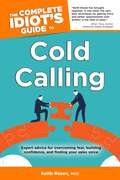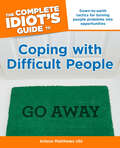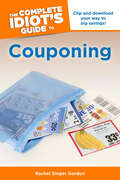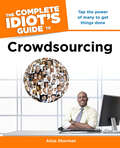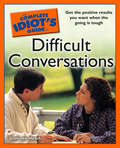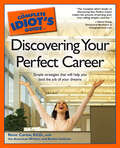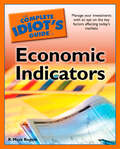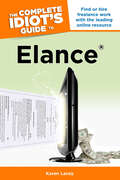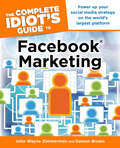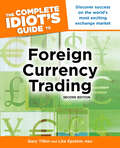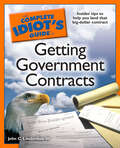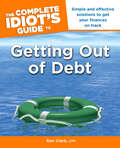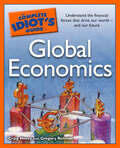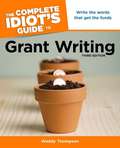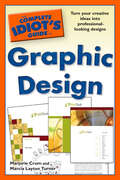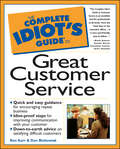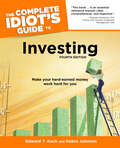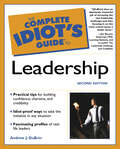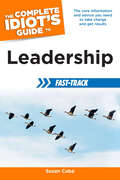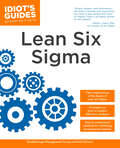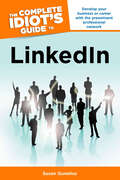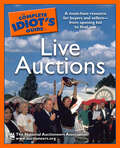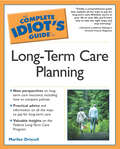- Table View
- List View
The Complete Idiot's Guide to Cold Calling: Expert Advice for Overcoming Fear, Building Confidence, and Finding Your Sales V
by Keith RosenDoes this sound familiar? &“If I could get in front of the prospect, the rest of the selling process becomes easier. It&’s just getting in front of them that&’s the challenge.&” The fact is most cold calling efforts are doomed from the start. Salespeople lose sales not due to a lack of effort, but because they lack a prospecting system they are comfortable with and can trust to generate greater, consistent results. If you are prospecting the same way you have been for the last several years (including the &“calling to check in, touch base or follow-up&” approach) or haven&’t been prospecting at all, you&’re simply making it easier for your competition to take away the new business you are working so hard to earn. So, if you love to sell but hate (or don&’t like) to prospect, this book is your opportunity to maximize your cold calling potential and boost your income by learning how to get in front of the right prospects in less time and create greater selling opportunities without the fear, pressure or anxiety associated with cold calling. This Complete Idiot&’s Guide® will show you how to: • Utilize the seven steps to a permission-based cold calling conversation so that you don&’t have to push your presentation and hope there&’s a fit. • Create winning voice mail messages that will ensure more return calls. • Develop your MVP (Most Valuable Proposition) that separates you from your competition. • Craft the Compelling Reasons that would motivate a prospect to speak with you. • Prevent and defuse initial objections, such as &“I'm not interested,&” &“We don't have any money now,&” or &“Call me back later.&” • Design your own step-by-step prospecting and follow-up system that runs on autopilot and is aligned with your selling philosophy, strengths, objectives, and natural talents rather than taking the generic, &“one size fits all&” approach. • Develop the right questions and uncover new selling opportunities in seconds so that you can stop wasting precious time on the wrong prospects.
The Complete Idiot's Guide to Coping With Difficult People
by Arlene UhlEasy ways of dealing with difficult people. Psychotherapist Arlene Matthews Uhl offers the most effective strategies for dealing with difficult people—from strangers and co-workers to friends and family—by characterizing the four major types and revealing specific methods to cope with them in every aspect of life. - Jargon-free, practical advice and strategies—for home and at work. - Unique approach based on behavioral patterns, not simply personality types. - Includes tactics on diffusing tense encounters in any situation. - Features tips for &“cutting the cord&” when personal relationships become too difficult.
The Complete Idiot's Guide to Couponing: Clip and Download Your Way to Big Savings!
by Rachel Singer Gordon• Combines couponing advice with up–to–date online coupon tips and a sensible approach
The Complete Idiot's Guide to Crowdsourcing: Tap the Power of Many to Get Things Done
by Aliza ShermanTap into the global talent pool Crowdsourcing leverages such social networking tools as Facebook and Twitter to tap into the power of many people to distribute one's work load or gain input. Aliza Sherman, crowdsourcing innovator, has helped her clients harness the incredible power of "crowd-think" and "crowd-do" to achieve goals as diverse as designing new products to test-marketing services to fundraising. In this guide, she explains the theory and practice of crowdsourcing and actually shows readers how to use it. • A practical, prescriptive guide for those who want to put the ideas in such books as The Wisdom of Crowds and Here Comes Everybody into action. • Step-by-step instructions. • Insightful anecdotes from the world of crowdsourcing.
The Complete Idiot's Guide to Difficult Conversations: Get the Positive Results You Want When the Going Is Tough
by Gretchen HirschHow to tackle sensitive subjectsCovering both professional and personal situations, this guide examines ways to approach and handle conversations that are often put off or avoided altogether. The most comprehensive book of its kind, it provides all the information you need to approach difficult conversations with confidence, avoid blaming, overcome defensiveness, and make better decisions.• The only book on the market covering difficult conversations in both the workplace and one&’s personal life• Can be read cover to cover or used as a quick reference guide• Reviewed and approved by the Program Chair of Organizational Communication at Franklin University and former professor of Applied Linguistics at Harvard University
The Complete Idiot's Guide to Discovering Your Perfect Career
by American Writers&Artists Inst Rene CarewWhat do you really want to do?Finding the perfect career isn&’t easy, but it&’s certainly attainable. This guide offers readers the chance to trade in their unsatisfying jobs for fulfilling careers. This book helps them by providing a process of self-assessment that includes questions on personality, talents, values, interests, and goals; advice on how to make a smooth transition from one career to another; and an action plan to take the steps toward landing the perfect career.• According to The Conference Group, only 48.9% of working Americans are satisfied with their jobs, the lowest level of job satisfaction since pollsters first began surveying the topic in 1995• Career self-discovery books are among the best-performing in the career category
The Complete Idiot's Guide to Economic Indicators: Manage Your Investments with an Eye on the Key Factors Affecting Today’s Market
by R. RogersAn expert helps readers understand what the big economic picture means for their money—and how to respond. Today's investors must play an active role in managing their money. This guide introduces the leading U.S. economic indicators and shows how to use them to make better investment decisions. Indicators covered include: national output; employment; consumer reports; housing and construction; and inflation. • The recession: the days of putting money in an index fund and forgetting about it are over • Most books on economic indicators are too academic, aimed at professionals, and written before the financial crisis • Author with over 25 years of tracking the economy
The Complete Idiot's Guide to Elance: Find or Hire Freelance Work with the Leading Online Resource
by Karen LaceyIn the midst of the worst recession since the Great Depression, a new sector has blossomed: the virtual work world. It's an oasis of sorts, one brimming with unfilled jobs. Elance.com is one of the largest and fastest-growing portals that connects freelancers who need work to businesses that need flexible, cost-effective workers in areas such as software development, creative and marketing, administration, writing and editing, engineering, accounting, legal, and more. The Complete Idiot's Guide® to Elance holds the key to business growth in the global age, for freelancers and employers alike. Through its step-by-step, illustrated advice, readers learn how to: Get started and register with Elance. Develop a contractor profile that stands out and sells their services. Win clients through targeted pitches and top-notch proposals. Find and attract the best contractors with advanced search tools and a well-done client profile. Write clear job postings quickly and easily. Use Elance's tools to manage projects efficiently. Negotiate deals and project agreements that protect both contractor and employer. Manage earnings and expenditures using Elance's account pages. Develop best practices using example and template profiles, proposals, and job postings.
The Complete Idiot's Guide to Facebook Marketing: Power Up Your Social Media Strategy on the World’s Largest Platform
by Damon Brown John Wayne ZimmermanCovers all aspects including Facebook Marketplace, Facebook Places, and Facebook Deals
The Complete Idiot's Guide to Financial Aid for College, 2nd Edition
by David RyeMost futures depend on it This comprehensive, fully updated edition shows readers how to get scholarships, find the best financial aid packages for academic or sports skills, improve one's chances of receiving financial aid, take advantage of the new tax laws to build a college savings plan, and much more. Also includes a newly updated yellow-pages directory with names, addresses, and information on where to inquire and how to apply for financial aid. • A must-have purchase for anyone considering budgeting for or financing a college education
The Complete Idiot's Guide to Foreign Currency Trading, 2E
by Lita Epstein Gary Tilkin• a roadmap for success• the strategies to use and pitfalls to avoid
The Complete Idiot's Guide to Getting Government Contracts
by John C. LauderdaleInside strategies and tips for small businesses seeking government business This guide takes the small business owner through the different vehicles of the government procurement process, showing how the government selects a contract winner. It goes step-by-step from registration through the bidding process and beyond. And while the book is weighted to federal contracts, there is plenty of coverage on winning state and local contracts as well. • In 2006, small businesses won $77 billion in federal contracts • Slow economy forcing small businesses to procure more contracts, at all levels of government • Inside strategies and tips: a vast majority of small business owners know nothing about getting government contracts
The Complete Idiot's Guide to Getting Government Jobs
by The Partnership for Public SvcBail yourself out with employment opportunities In these turbulent times when private corporations are in trouble, the employer that seems to be offering the most stable employment opportunities is the public sector. With The Complete Idiot's Guide® to Getting Government Jobs, readers will learn how to navigate the government application process to find stable employment opportunities available from county municipalities as well as state and federal agencies. • Includes advice on drafting resumes suited to the specific requirements of the hiring agency • How to complete the appropriate application most effectively • Methods of marketing an applicant's skills in the government sector • Search tools for government job websites
The Complete Idiot's Guide to Getting Out of Debt: Simple and Effective Solutions to Get Your Finances on Track
by Ken ClarkBorrowing from Peter to pay Paul? The American economy is dragging, with unemployment rates rising and consumer debt hitting $2.5 trillion. Many people are in deep and need help. Here, a Certified Financial Planner explains the mathematics of debt; strategies to deal with credit card, mortgage, student, and other loans; why debt consolidation and taking loans from a 401(k) can lead to problems; truths about bankruptcy; and how to use debt while eliminating it.• Includes essential resources and websites, sample letters and forms, loan forgiveness programs, bankruptcy resources• Author a Certified Financial Planner• Covers every kind of debt, mortgages to credit cards to student loans• National credit card debt is growing exponentially
The Complete Idiot's Guide to Global Economics: Understand the Financial Forces That Drive Our World—and Our Future
by Craig Hovey Gregory RehmkeThink outside the borders. Global economics affects every aspect of our lives. Free trade agreements, tariffs, terrorism, trade deficits, international debt, global warming, OPEC, outsourcing, and sweat shops are just some of the forces driving our world, food supply, jobs, and future. The Complete Idiot's Guide® to Global Economics provides the key to understanding the various facts, figures, policies, and practices that offer insight into this dynamic subject.
The Complete Idiot's Guide to Grant Writing, 3rd Edition
by Waddy ThompsonAn updated and revised edition-offering new information on some of the most popular topics in grant writing. This new edition of The Complete Idiot's Guide(r) to Grant Writing provides essential information on how to start a freelance business, covering such topics as getting that first assignment, pricing, state regulations, organizing and customizing proposals, researching funders, sponsorship, and much more. In the current economic environment, government and private sector grants will continue to be an important way to acquire funds for projects. Includes grant writing samples. This book's templates and other resources will now be easy to find and use on idiotsguides.com.
The Complete Idiot's Guide to Graphic Design: Turn Your Creative Ideas into Professional-Looking Design
by Marcia Layton Turner Marjorie CrumIf you can dream it, you can design it Whether your goal is to design your own marketing materials, launch a visually compelling blog, or just have some fun creating your own CD covers, The Complete Idiot&’s Guide® to Graphic Design is your one-stop reference. Presented in an intuitive, accessible format, here are the fundamental elements of design and design principles, as well as instruction on how to apply those elements and principles to a variety of projects. • Covers art supplies, software, concept development, reproduction needs, and much more • Sample projects include business cards, print and web ads, and graphic T-shirts • Follows the success of other titles aimed at the aspiring artist, including the Complete Idiot&’s Guide® titles on digital photography, drawing, and manga
The Complete Idiot's Guide to Great Customer Service
by Ron KarrYou're no idiot, of course. You skillfully manage your kids' temper tantrums, diplomatically handle office politics, and even pleasantly deal with your friends' bickering. But when it comes to handling customer service, you feel utterly lost. It's time to make great customer service an indispensable part of your daily operation! The Complete Idiot's Guide® to Great Customer Service teaches you how to create the "Service Difference"—service that genuinely pleases your customers and sets your organization apart from the pack.
The Complete Idiot's Guide to Investing, 4th Edition: Make Your Hard-Earned Money Work Hard for You
by Debra Johnson Edward T. KochA penny saved may be a penny earned, but a penny invested can be even more. In this financial crisis, old advice about equities, mutual funds, commodities, and real estate may no longer hold. Here is a fresh look at all aspects of investing to help readers protect and grow their wealth. This edition includes the most current information on: • Corporate fundamentals• The sub-prime crisis and its effects• Practical tools for evaluating mutual funds• Advice about riding the equity market• The use of Exchange Traded Funds
The Complete Idiot's Guide to Leadership
by Andrew J. DubrinYou're no idiot, of course. You handle your work assignments, monitor the progress of your workgroup, and meet your goals. But when it comes to inspiring others and creating change in your organization, you're confused about what to do next. Want some help? The Complete Idiot's Guide® to Leadership shows you how to start thinking and acting like a leader who can help people perform well and meet organizational goals for increased productivity, quality, and customer satisfaction.
The Complete Idiot's Guide to Leadership Fast-Track: The Core Information and Advice You Need to Take Charge and Get Results
by Susan CabaWritten to quickly develop the reader&’s leadership skills, The Complete Idiot&’s Guide® to Leadership, Fast-Track is a short, but rich introduction to leadership skills and how best to use them. After a brief examination of the required, but learnable, qualities, skills, and behaviors of leadership, the book takes the reader through a self-assessment. Then the tasks, strategies, and desired results of leadership are dissected—all in 160 pages! The Complete Idiot&’s Guide® to Leadership Fast-Track is perfect for new managers, small business owners, organization leaders, and more!
The Complete Idiot's Guide to Lean Six Sigma: Get the Tools You Need to Build a Lean, Mean Business Machine
by Neil DeCarlo Breakthrough Management GroupThe perfect prescription for any organization. Increasingly popular with large and mid-sized companies around the world, Lean Six Sigma is the new hybridization of Six Sigma and Lean methodologies, and there is no better approach for achieving operational excellence in an organization. But how do you implement Lean Six Sigma, and what does it entail? The Complete Idiot&’s Guide® to Lean Six Sigma answers this question with unprecedented clarity and turnkey elegance. Part one gives you all the background you need to understand Lean Six Sigma–what it is, where it came from, what it has done for so many organizations, and what it can do for you and your company. Parts two and three of the book give you a prescribed yet flexible roadmap to follow in selecting, enacting and realizing improvements from Lean Six Sigma projects. Within this step-by-step structure, the authors demonstrate when and how to use the many Lean Six Sigma statistics and &“tools&”–packing the pages with diagrams, real-life examples, templates, tips, and advice. If you are a Green Belt or a Black Belt, or a trainee, these two parts will be invaluable to you. The Complete Idiot&’s Guide® to Lean Six Sigma is the smartest choice if you need a comprehensive primer, and especially if you need to actually improve a process or spread Lean Six Sigma capability throughout your company. It is the best comprehensive reference available to get you on your way to becoming a lean, mean business machine!
The Complete Idiot's Guide to LinkedIn: Develop Your Business or Career with the Preeminent Professional Network
by Susan GuneliusDevelop your business or career with the pre-eminent professional network Most people who are new to LinkedIn don't intuitively recognize the potential of the site when it comes to promoting a business, finding a job/project (or being found for one), or raising money for a business venture. The Complete Idiot's Guide® to LinkedIn goes beyond the usual "how to set up and account" and "create a profile" to help readers become LinkedIn super-users and get the most out of the website based on their individual goals. The book provides new users with clear and detailed guidance on: • Filling out the various parts of the LinkedIn profile, customizing it to meet specific professional goals • The right and wrongs ways of doing things on LinkedIn-especially helpful to those used to Facebook• Finding the right people, making the right introductions, and growing and managing networks • Finding and communicating with LinkedIn Groups to help achieve individual business goals • Specific suggestions for using LinkedIn to find a job, market a business, raise capital, and increase sales
The Complete Idiot's Guide to Live Auctions: A Must-Have Resource for Buyers and Sellers—from Opening Bid to Final Sale
by The National Auctioneers AssocDo I hear $16.95? A $227.5 billion enterprise around the world, live auctions feature everything from cars to homes, fine art to coal. The only book of its kind, this guide will show how lucrative, fast-paced, and exciting this business is. It covers rules, lingo, setting up an auction, hiring professional auctioneers, and how the most popular auctions work. • 24% of U.S. consumers, or around 50 million people, spend an average of four hours at live auctions each year • Expert author: the National Association for Auctioneers • Detailed run-down of every aspect of live auctions • Resource section with auction house listings
The Complete Idiot's Guide to Long-Term Care Planning
by Marilee DriscollThe basic motivators will drive people to want to learn more about this topic—fear, money, and insecurity. Consumers fear losing their life savings to LTC costs. Yet, they hesitate to buy insurance with an annual premium of $1,800 without knowing what it covers.In October of 2002 (one month after this book's release), the federal government will be rolling out a payroll deduction plan whereby all government employees and retirees (approximately 18 million people) will have the same opportunity to save for their long-term care needs as they currently have for their 401(k).
